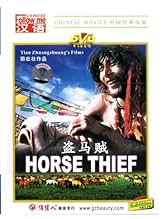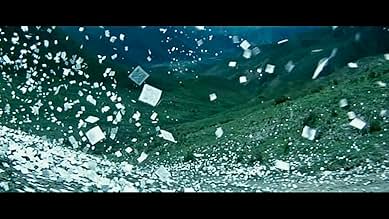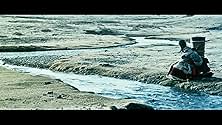NOTE IMDb
6,8/10
1,7 k
MA NOTE
Ajouter une intrigue dans votre langueA Tibetan man struggles to provide for his family.A Tibetan man struggles to provide for his family.A Tibetan man struggles to provide for his family.
- Réalisation
- Scénario
- Casting principal
- Récompenses
- 1 victoire au total
Avis à la une
I'm not Martin Scorsese, I'm not a film student, I'm just a guy who likes movies. I saw this film tonight and found myself a little mystified over all the praise. I'm also not the Summer Blockbuster guy either so that's not my justification for not gushing about this film.
I will remember the primitiveness and brutality of life in Tibet. I will remember the colorful and confusing religious rituals. I'm sure they'd say the same thing about Catholicism. The landscape is beautiful, but that kind of sells itself. Why does the director take credit for that?
As stated on other reviews there are several scenes of sheep abuse which are less than politically correct. OK yeah, I get it, it's a different culture. Doesn't make it easier to watch.
Working with a group of non-actors is a major hurdle to overcome and I salute Tian for overcoming this.
I kept thinking it a bit odd that Norbu's wife had no idea what he did for a living. I also found it a bit odd that she had no recrimination for him after getting banished. Further more I'd have thought she'd really see red when their son dies, probably as a result of their standard of living after being banished. Perhaps this is a cultural difference. I understand the director is making a political statement in this film, but ultimately it seems fairly universal, not a product of Chinese society specifically.
To sum up the dubbing was awful, the sound quality in general was very poor, character development was fairly minimal and the one scene of violence (people on people) was not very convincing. I'm sure I would need to go to film school to find out why this film was called the best of the decade, but if you need that much education to appreciate something is it really worth it in the end?
I will remember the primitiveness and brutality of life in Tibet. I will remember the colorful and confusing religious rituals. I'm sure they'd say the same thing about Catholicism. The landscape is beautiful, but that kind of sells itself. Why does the director take credit for that?
As stated on other reviews there are several scenes of sheep abuse which are less than politically correct. OK yeah, I get it, it's a different culture. Doesn't make it easier to watch.
Working with a group of non-actors is a major hurdle to overcome and I salute Tian for overcoming this.
I kept thinking it a bit odd that Norbu's wife had no idea what he did for a living. I also found it a bit odd that she had no recrimination for him after getting banished. Further more I'd have thought she'd really see red when their son dies, probably as a result of their standard of living after being banished. Perhaps this is a cultural difference. I understand the director is making a political statement in this film, but ultimately it seems fairly universal, not a product of Chinese society specifically.
To sum up the dubbing was awful, the sound quality in general was very poor, character development was fairly minimal and the one scene of violence (people on people) was not very convincing. I'm sure I would need to go to film school to find out why this film was called the best of the decade, but if you need that much education to appreciate something is it really worth it in the end?
10zzmale
The theme behind this movie is the same as that of Ben Ming Nian (1990) directed by Mr. Fei Xie: criminals trying to go straight but are forced to go back to the old ways for survival due to lack of opportunities.
The theme reflected the problem of current society, and the problem started in the 1980's. As one of his early works and the political climates of China back then, it is understandable that the director adopted the cautious approach by using remote region such as Tibet and time setting that is more than half a century ago. One really needs to acknowledge the problem of current China (and in fact, the problem of many countries), in order to discover the link between the movie and its subtle attempt to criticize the contemporary society.
The theme reflected the problem of current society, and the problem started in the 1980's. As one of his early works and the political climates of China back then, it is understandable that the director adopted the cautious approach by using remote region such as Tibet and time setting that is more than half a century ago. One really needs to acknowledge the problem of current China (and in fact, the problem of many countries), in order to discover the link between the movie and its subtle attempt to criticize the contemporary society.
A fascinating window into the world of Tibetan tribal life. Beautifully shot with stunning locations. The narrative is a little weak, but makes up for it visually.
One draw back is a few scenes of animal cruelty. These images are what stayed with me most and unfortunately let down the movie.
I cannot help thinking that Tian Zhuangzhuang is not only the least appreciated of the great contemporary Chinese directors, but also the least talented - his films (that is, the three that I have seen) made a lesser impression on me than, let's say, the works of Jia Zhangke or the nineties' output of Zhang Yimou.
"Lan feng zheng" (The Blue Kite), a socio-critical portrait of life in Communist China, seems a bit too static in its quiet, sober realism, with the director's continuous effort to charge Maoism tending to veil everything else ; only in the last segment the movie became truly touching for me.
In "Xiao cheng zhi chun" (Springtime in a Small Town) a couple of characters are, zombie-like, dragging past ornamental decorations of dilapidating claustrophobic interiors, or alternately walking on ruins of an ancient city wall ; I found this hardly anything more than a rather boring, banal quasi-Chekhovian étude.
The last - in fact, the oldest - of the three, "Dao ma zei" (The Horse Thief), is quite different. Minimalistic in plot and dialogues, it might be described as a sort of ethnographic documentary with touches of folk ballad : lyrical cinema close to some works of the Armenian Parajanov, albeit, to my regret, lacking his emotional power. Tibetan nature is the vamp of the movie, local religion + magic its core. The former I do savour, the latter I struggle to grasp, owing to the fact that my knowledge of it is considerably limited.
The last reason why I don't praise "The Horse Thief" as Scorsese did, may lie in the quality of the Chinese region-free disc (gzbeauty). Nevertheless, the non-anamorphic image from an old print, dirty and scratched, is better than I expected. It can be zoomed to proper OAR 2,35:1 on my player, though there's no room for subtitles then. For second viewing, they are not necessary anyway.
For those who liked "The Horse Thief" but felt deprived of the epic/action element, I would recommend "Kekexili" (Mountain Patrol) by Tian's compatriot Lu Chuan.
"Lan feng zheng" (The Blue Kite), a socio-critical portrait of life in Communist China, seems a bit too static in its quiet, sober realism, with the director's continuous effort to charge Maoism tending to veil everything else ; only in the last segment the movie became truly touching for me.
In "Xiao cheng zhi chun" (Springtime in a Small Town) a couple of characters are, zombie-like, dragging past ornamental decorations of dilapidating claustrophobic interiors, or alternately walking on ruins of an ancient city wall ; I found this hardly anything more than a rather boring, banal quasi-Chekhovian étude.
The last - in fact, the oldest - of the three, "Dao ma zei" (The Horse Thief), is quite different. Minimalistic in plot and dialogues, it might be described as a sort of ethnographic documentary with touches of folk ballad : lyrical cinema close to some works of the Armenian Parajanov, albeit, to my regret, lacking his emotional power. Tibetan nature is the vamp of the movie, local religion + magic its core. The former I do savour, the latter I struggle to grasp, owing to the fact that my knowledge of it is considerably limited.
The last reason why I don't praise "The Horse Thief" as Scorsese did, may lie in the quality of the Chinese region-free disc (gzbeauty). Nevertheless, the non-anamorphic image from an old print, dirty and scratched, is better than I expected. It can be zoomed to proper OAR 2,35:1 on my player, though there's no room for subtitles then. For second viewing, they are not necessary anyway.
For those who liked "The Horse Thief" but felt deprived of the epic/action element, I would recommend "Kekexili" (Mountain Patrol) by Tian's compatriot Lu Chuan.
This is a movie about human beings living in the stark and pitiless land of Tibet. Tibetans have a clear if not too numerous a presence in North India and I always felt deeply curious about these strangers from a land not too distant yet strange and mysterious. My first memories of these people are of tattered nomads moving in groups. Today they are educated, vocal and have prospered economically on Indian soil.The present film is like a response to an inborn craving to visit this land.
It is set in 1923, thus steering clear of political controversies in China, of which Tibet is now a part. Tibet is the highest plateau in the world, with an average altitude of 16,000 feet. Going by this film, it also seems the most wind blown place. The mists are always floating swiftly away and the pennants planted near temples fluttering noisily like an array of weathercocks. I cannot remember any movie with such splendor of cinematography, not even David Lean at his best. It is a world of transcendent beauty. There is nothing of the picture postcard tailor's dummy prettiness. The azure mountains, snow deserts and water bodies live and breathe as though with the presence of stern deities. The musical score , comprising natural sounds, muffled incantations and a continuous drone punctuated with funereal beats of percussion unspoken script or reverent commentary on this extra terrestrial world.
Norbu is a poor member of a nomadic tribe. He has a wife and small boy to support. Though devout he is forced into stealing horses for survival. He is expelled from his group under sentence of amputation if he should return. The film follows his journey through different regions in the course of which he loses his son to disease and sires another one. Religion and ceremonies dominate the life of these simple minded and plainspoken folk. Probably they need this belief as a necessity in their lives with death and starvation constantly dangling over them. Norbu is a god fearing person and it is only to save his offspring from the jaws of starvation that he is driven to stealing. He contributes a good part of his "earnings" to the temple.
Both the mood and the score is reminiscent of Tarkovsky's Stalker. These snow blown mountains and deserts are also inhabited by a mysterious presence hinting at realities other than the familiar. The word mesmeric applied to this film is not a cliché but an accurate description of it's power.
At the end of the day, people are the same--in Tibet, Calcutta or in the US.
It is set in 1923, thus steering clear of political controversies in China, of which Tibet is now a part. Tibet is the highest plateau in the world, with an average altitude of 16,000 feet. Going by this film, it also seems the most wind blown place. The mists are always floating swiftly away and the pennants planted near temples fluttering noisily like an array of weathercocks. I cannot remember any movie with such splendor of cinematography, not even David Lean at his best. It is a world of transcendent beauty. There is nothing of the picture postcard tailor's dummy prettiness. The azure mountains, snow deserts and water bodies live and breathe as though with the presence of stern deities. The musical score , comprising natural sounds, muffled incantations and a continuous drone punctuated with funereal beats of percussion unspoken script or reverent commentary on this extra terrestrial world.
Norbu is a poor member of a nomadic tribe. He has a wife and small boy to support. Though devout he is forced into stealing horses for survival. He is expelled from his group under sentence of amputation if he should return. The film follows his journey through different regions in the course of which he loses his son to disease and sires another one. Religion and ceremonies dominate the life of these simple minded and plainspoken folk. Probably they need this belief as a necessity in their lives with death and starvation constantly dangling over them. Norbu is a god fearing person and it is only to save his offspring from the jaws of starvation that he is driven to stealing. He contributes a good part of his "earnings" to the temple.
Both the mood and the score is reminiscent of Tarkovsky's Stalker. These snow blown mountains and deserts are also inhabited by a mysterious presence hinting at realities other than the familiar. The word mesmeric applied to this film is not a cliché but an accurate description of it's power.
At the end of the day, people are the same--in Tibet, Calcutta or in the US.
Le saviez-vous
- AnecdotesNumber 1 on Martin Scorsese's top 10 movies of the 90s list, which he presented on a special episode of At the Movies with Roger Ebert. Even though the movie was made and released in the 80s, it gain traction in the US during the 90s.
- ConnexionsFeatured in Siskel & Ebert & the Movies: Best of the '90s (2000)
Meilleurs choix
Connectez-vous pour évaluer et suivre la liste de favoris afin de recevoir des recommandations personnalisées
- How long is The Horse Thief?Alimenté par Alexa
Détails
Contribuer à cette page
Suggérer une modification ou ajouter du contenu manquant



















